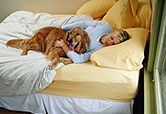 A service of the U.S. National Library of Medicine
A service of the U.S. National Library of Medicine  National Institutes of Health
National Institutes of Health

Pets May Help Kids With Autism Develop Social Skills

WEDNESDAY, Aug. 1 (HealthDay News) -- Introducing a pet into the home of a child with autism may help that child develop improved social behaviors, new research finds.
The study, from French researchers, is the first strong scientific evidence that animals may help foster social skills in individuals with autism, but it also reinforces what clinicians have been hearing anecdotally for years.
"We hear from parents a lot that having a pet or interacting with an animal really helps their child's social behavior, but there hasn't been a study so far that has looked at that scientifically," said Alycia Halladay, director of environmental research at Autism Speaks. "This offers some intriguing evidence to confirm what parents have been saying."
Halladay was not involved with the study, which was published online Aug. 1 in the journal PLoS ONE.
Problems with communication are one of the hallmarks of autism and strategies to combat this are central to autism therapy.
According to Halladay, some people with autism use service dogs but usually to address a particular handicap, such as problems with motor coordination or hearing loss, although not yet for social skills.
Previous studies have verified that having a pet in the house actually improves family bonding and can improve the social skills of a non-autistic child as he or she learns to share with the pet and care for it.
To see if pets might have the same effect in children with autism, the study authors compared the children's social interactions (as reported by the parents of the children with autism) in three different settings: households that had never had a pet; homes that had had a pet since the child's birth; and households that had acquired a pet after the child turned 5.
In total, 260 individuals with autism were involved and the researchers were most interested in social interactions when the child was 4 or 5 years of age, because this is when the social impairments are often at a peak.
Out of 36 measures, participants who had acquired a pet after they were born scored higher in the two categories of "offering to share" and "offering comfort" after having the pet for a few years.
There was no relationship between each individual's IQ and the impact of the pet, leading the authors to conclude that "the benefits that the animals may have on individuals with autism don't seem related to how serious the autism was," said study author Marine Grandgeorge, clinical research associate at the Autism Resource Center of Academic Hospital in Brest, France.
Pets may promote pro-social behavior by acting as "distracters," Grandgeorge suggested.
"When a human is in a stressful situation, a pet seems to distract him/her from the [anxiety-producing] stimulus," she explained.
Another possibility is that the pet may help the child learn how to interpret communication signals and cues, enabling them to adjust their behavior, she added.
As to why introducing a pet later in life would have the greater effect, one possible explanation is that "the arrival of a pet strengthens the cohesion of the family," said Grandgeorge. "Most families acquiring a pet experienced an increase in quantity and quality of time spent together, and felt happier after the pet's arrival. This new mood may have positive effects on individuals with autism."
But positive findings from this one small study are not necessarily a reason to go out and buy or adopt a pet because the strategy could backfire, Grandgeorge said.
"Anecdotally, I observed a child who was focused all the time on his cat. He [had to] know where it was, what it was doing all the time and he was setting up rituals with it [and] being separated [from the] cat was a source of anxiety," Grandgeorge recounted. "All the family, including the cat, lived sorely with this situation."
SOURCES: Marine Grandgeorge, Ph.D., clinical research associate, Autism Resource Center, Academic Hospital, Brest, France; Alycia Halladay, Ph.D., director, environmental research, Autism Speaks; Aug. 1, 2012, PLoS ONE, online
- More Health News on:
- Autism
- Children's Health